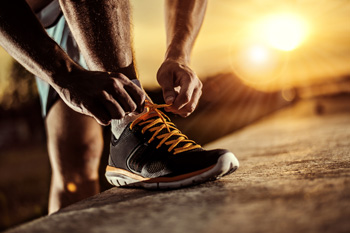 Many new runners experience injuries that occur from running, and recent research has suggested that it's helpful to learn about preventative techniques. Performing proper stretches before running any type of distance is important in maintaining flexibility, but stretching too deeply may result in developing pulled muscles. It’s suggested that stretching should start at a slower pace, enabling the tendons and ligaments to warm up. "Overuse injuries" are common among runners, and these may include shin splints, sprains, and stress fractures. If you start your warm-up practice by walking at a slow pace before starting the run, the possibility of incurring injuries may be diminished. This enables the cells and fibers in the muscles to gradually tear and then rebuild stronger than they were. If you are contemplating incorporating running into your regular routine, please consult with a podiatrist for additional information on how to prevent running injuries to the foot and ankle.
Many new runners experience injuries that occur from running, and recent research has suggested that it's helpful to learn about preventative techniques. Performing proper stretches before running any type of distance is important in maintaining flexibility, but stretching too deeply may result in developing pulled muscles. It’s suggested that stretching should start at a slower pace, enabling the tendons and ligaments to warm up. "Overuse injuries" are common among runners, and these may include shin splints, sprains, and stress fractures. If you start your warm-up practice by walking at a slow pace before starting the run, the possibility of incurring injuries may be diminished. This enables the cells and fibers in the muscles to gradually tear and then rebuild stronger than they were. If you are contemplating incorporating running into your regular routine, please consult with a podiatrist for additional information on how to prevent running injuries to the foot and ankle.
All runners should take extra precaution when trying to avoid injury. If you have any concerns about your feet, contact one of our podiatrists of Pennsylvania. Our doctors will treat your foot and ankle needs.
How to Prevent Running Injuries
There are a lot of mistakes a runner can make prior to a workout that can induce injury. A lot of athletes tend to overstretch before running, instead of saving those workouts for a post-run routine. Deep lunges and hand-to-toe hamstring pulls should be performed after a workout instead of during a warmup. Another common mistake is jumping into an intense routine before your body is physically prepared for it. You should try to ease your way into long-distance running instead of forcing yourself to rush into it.
More Tips for Preventing Injury
- Incorporate Strength Training into Workouts - This will help improve the body’s overall athleticism
- Improve and Maintain Your Flexibility – Stretching everyday will help improve overall performance
- “Warm Up” Before Running and “Cool Down” Afterward – A warm up of 5-10 minutes helps get rid of lactic acid in the muscles and prevents delayed muscle soreness
- Cross-Training is Crucial
- Wear Proper Running Shoes
- Have a Formal Gait Analysis – Poor biomechanics can easily cause injury
If you have any questions, please feel free to contact one of our offices located in Plymouth Meeting and Ambler, PA . We offer the newest diagnostic and treatment technologies for all your foot care needs.
